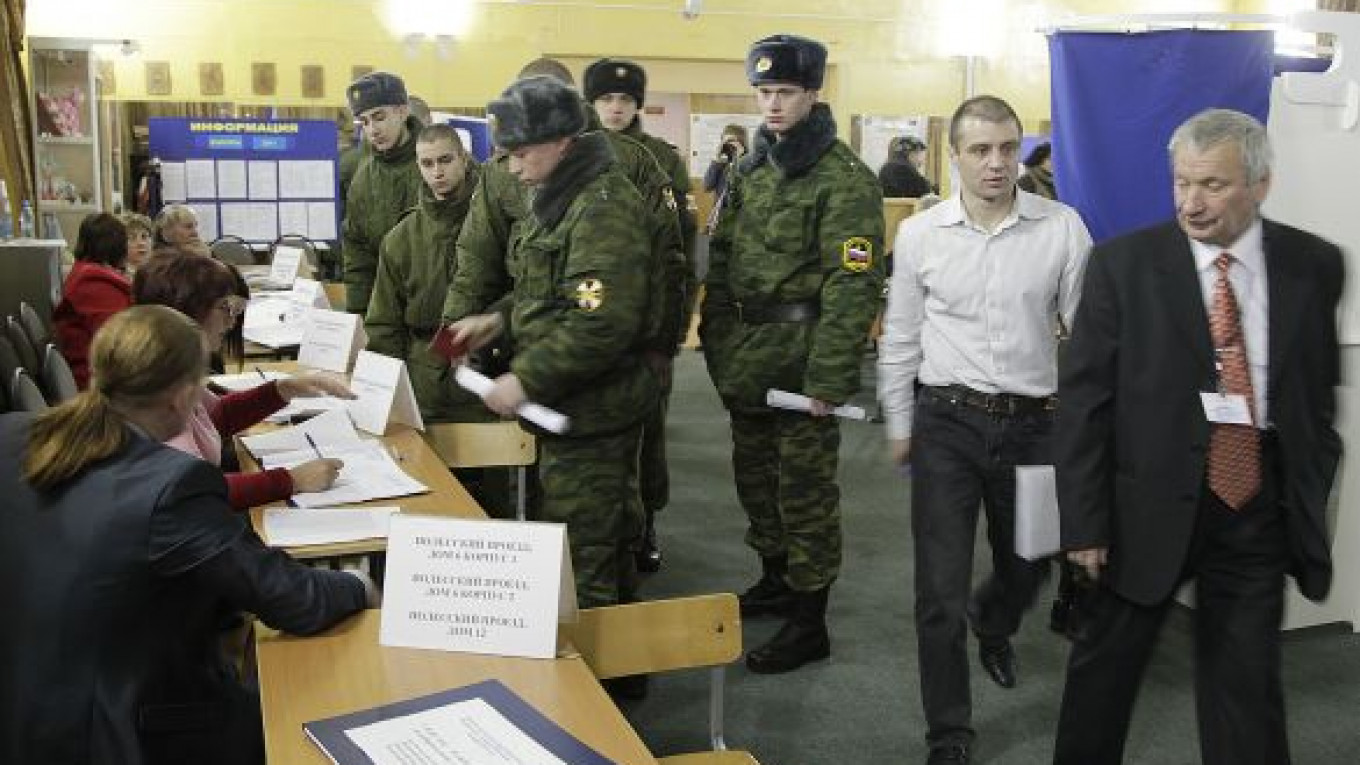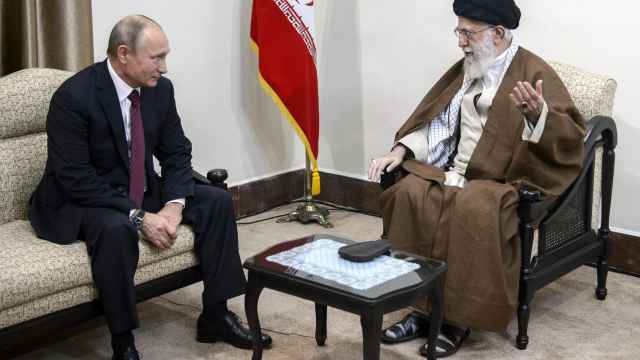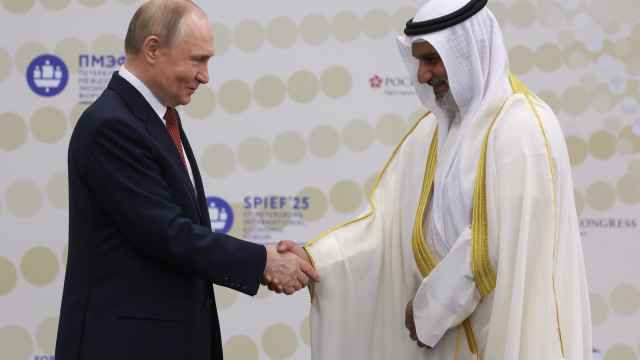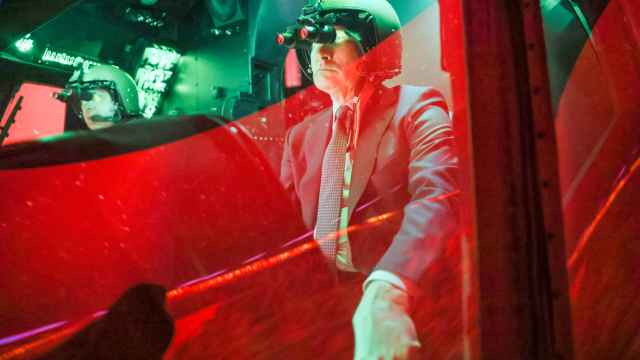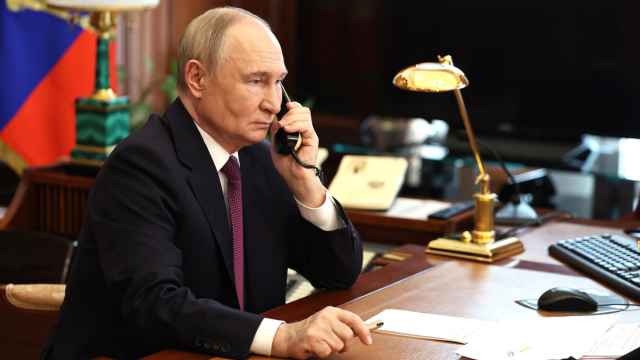Russia's electoral system has undergone an unexpected shock in recent months, with large-scale protests sweeping the nation following allegations of widespread fraud in December's State Duma vote.
While the public outcry has resulted in an openness for opposition voices not seen in years and a genuine feeling that change is in the air, the names on the ballot for the March 4 presidential vote and the expected outcome will not likely come as a surprise.
As Vladimir Putin seeks to return to the presidency for the third time, he faces four officially sanctioned candidates. Three others tried to run but failed to get on the ballot. But with the air of uncertainty that has descended over the country, talk has turned to several other public figures who have inspired hope but have not decided whether to join the fight themselves.
Here's a brief look at who is running, who wanted to run and who everyone is talking about. Polling data reflects the most recent information available.
Sergei Mironov
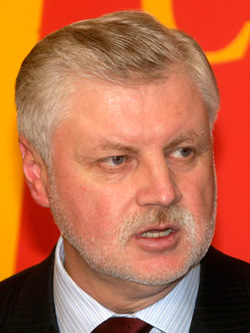
Party affiliation: A Just Russia
Background/platform: A trained geologist and former head of the Federation Council, Mironov, 59, ran for president against Vladimir Putin in 2004. He said he was acting as a "stand-in" for the president to guarantee an actual election would take place. In the end, Mironov received less than 1 percent of the vote. He was purged from the council in 2011 by Putin's United Russia party and has become more of an opposition figure since, saying publicly he wants to "win over" Putin.
Strengths and weaknesses: He may be the only moderate left alternative to independent candidate Mikhail Prokhorov and Communist Party leader Gennady Zyuganov. He has a reputation for running a tight ship and has not been accused of corruption, but his avoidance of attacking Putin directly and his refusal to speak at the opposition rallies — despite pressure to do so from his own party — have weighed on him. Ultimately, Mironov lacks a certain personal charisma that has resulted in him having lower approval ratings than his own party.
Business climate: If elected, Mironov promises to raise taxes on the rich, abolish the Unified State Exam for schools, bar offshore companies from exploiting Russian mineral resources and create a 20 percent export tax on capital outflows.
Chances: "Mironov might only have a chance if he poses stronger opposition to Putin," said independent analyst Stanislav Belkovsky.
| VTsIOM (state-owned): | 3 percent |
| Levada (independent): | 4 percent |
| Gazeta.ru (online): | 2.5 percent |
— Alexander Bratersky
Mikhail Prokhorov
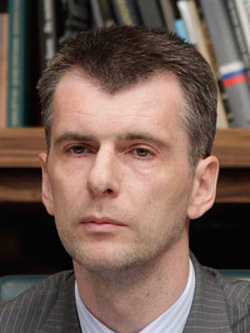
Party affiliation: Independent (formerly of Right Cause).
Background/platform: The 46-year-old billionaire businessman has styled himself as the "white knight" candidate for the country's increasingly assertive middle class. He is the only official candidate to have appeared at recent opposition rallies and his platform mirrors the protesters' demands for free elections and political liberalization. But many view him suspiciously as a possible Kremlin stalking horse candidate designed to distract protesters' attention.
Strengths and weaknesses: Prokhorov has pledged to tackle corruption and red tape, which could woo pro-business voters. But the metal magnate's extravagant wealth — estimated at up to $18 billion — combined with his suspected links to the Kremlin, could make it difficult for him to gain voters' trust. He is also a relative unknown compared to his opponents and has never held public office.
Business climate: Prokhorov states that his main goal is to boost efficiency and reduce waste in the economy by promoting competition. He pledges to battle monopolies, strengthen controls on illegal immigration and increase state investment in scientific research. He also proposes privatizing state corporations and working with private businesses to improve the country's infrastructure. Analysts praise his pledge to fight corruption and bureaucracy, though they said it wasn't clear how he would succeed.
Chances:
| VTsIOM (state-owned): | 5 percent |
| Levada (independent): | 4 percent |
| Gazeta.ru (online): | 19.3 percent |
— Jonathan Earle
Vladimir Putin
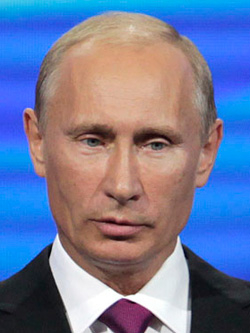
Party affiliation: Candidate of United Russia, although he is not a party member.
Background/platform: Putin has everything a candidate can dream of. He has dominated national politics for the past 12 years. During his first two terms as president from 2000 to 2008, the country saw unrivaled economic growth and prosperity, and his popularity soared to the breathtaking heights of over 75 percent. When he resigned four years ago due to a constitutional limit on a third consecutive term, he entrusted the Kremlin to a longtime confidant while he continued to wield influence by becoming the most powerful prime minister in post-Soviet history. And yet, Vladimir Putin faces the biggest challenge of his career. His announcement last September that he would run for a third term and allegations of widespread fraud at the State Duma elections alienated wide swaths of society, prompting unprecedented mass protests in Moscow and other cities, where tens of thousands chanted "Putin Go Away."
Strengths and weaknesses: Putin started to fight against sliding approval ratings back in May 2011 by founding the All-Russia People's Front, which unites all his supporters under a brand different from the increasingly unpopular United Russia party, which Putin chairs but never joined. Critics argue that the plan failed miserably on Dec. 4, because despite massive vote-rigging United Russia won only 49 percent, 15 percentage points less than in 2007. Some polls suggest that Putin won't get more than 50 percent in the March 4 vote, making a second round necessary. But most experts predict that the Kremlin won't allow that to happen.
Business climate: Putin's main argument is that he alone guarantees stability, and that all other candidates carry a risk of somehow ruining the country. This line of thought is often shared by foreign investors, although many of them had hoped for a second presidency for Dmitry Medvedev.
In February, Putin announced that he wants to make Russia "among one of the top 20 countries in the world" in terms of its business climate. But as more and more people in the country are prepared to openly challenge his rule, nobody expects that Putin's third presidency will be an easy ride. The growing consensus is that the country and its leadership are facing rougher times.
Chances:
| VTsIOM (state-owned): | 53 percent |
| Levada (independent): | 37 percent |
| Gazeta.ru (online): | 6.8 percent |
— Nikolaus von Twickel
Vladimir Zhirinovsky
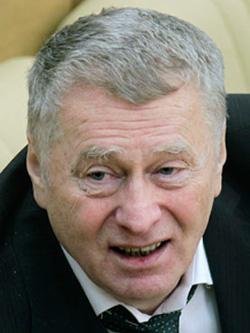
Party affiliation: Liberal Democratic Party of Russia
Background/platform: Zhirinovsky, 65, is no stranger to presidential elections having run four times previously in 1991, 1996, 2000 and 2008. Zhirinovsky is well-known for his wild tirades and strongly nationalist positions. If elected, he vows to turn Russia into a parliamentary republic, do away with ethnic territorial divisions and declare Russians the chief nationality of the country. He wants to build more roads, reform the political and economic system, reverse capital outflows and revitalize the army and sciences.
Strengths and weaknesses: Zhirinovsky has 18 years of experience in the legislature, speaks English, French, German and Turkish and is an expert on the Middle East and Asia. But he is tainted by his somewhat buffoonish image as public brawler who engages in offensive shouting matches with his opponents. His nationalist rhetoric has turned off many, and his party is often viewed as a patronage machine that is merely a Kremlin puppet.
Business climate: Zhirinovsky is a strong supporter of small businesses and advocates interest-free loans and lower taxes for startups. He calls for as much privatization of state-run businesses as possible and complete economic freedom for the regions and municipalities. His party platform also calls for abolishing income tax for those who earn less than 10,000 rubles ($330) per month, the introduction of a luxury tax, giving unemployed ethnic Russians priority for jobs over migrants and fixing the minimum salary at 100 rubles ($3) an hour starting in 2014.
Chances:
| VTsIOM (state-owned): | 8 percent |
| Levada (independent): | 5 percent |
| Gazeta.ru (online): | 1.6 percent |
— Natalya Krainova
Gennady Zyuganov
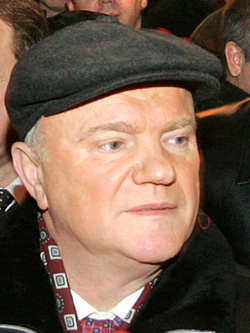
Party affiliation: Communist Party
Background/platform: Trained as a mathematician and teacher, Zyuganov rose in the party ranks back in the Soviet Union and has been party chairman since 1995. Zyuganov, 67, claims that under his rule, Russia would have "the government of people's trust" that will include members of various parties along with nonpartisans. According to his platform, Zyuganov plans to combat social inequality, demographic problems, the breakdown of the defense industry, moral degradation and the oil dependence of the economy. If elected, Zyuganov vows to hold early parliamentary elections on Dec.1, 2012, and reduce the presidential term to five years. City and district judges will be chosen through popular election. Russia will forge closer political and economic relations with CIS countries, including Ukraine, Belarus and Kazakhstan, forming a "union of brotherhood nations."
Young people will receive more state support and free education, while the population will be entitled to free medicine. Rural areas will also receive greater attention and collective farms will be reinstated.
Strengths and weaknesses: While the Communist Party platform still has a solid core of supporters — mainly among pensioners — it has had trouble connecting with younger voters for some time. Zyuganov has been accused of failing to modernize the Communist Party platform.
Business climate: Zyuganov wants to maintain nationalization in key industries — including oil — and sectors like banking, energy, plane construction and railway transportation. He stresses that private business would still continue to exist in a renewed communist state. "We support small business, it's inevitable," Zyuganov has said.
Chances:
| VTsIOM (state-owned): | 10 percent |
| Levada (independent): | 8 percent |
| Gazeta.ru (online): | 19.3 percent |
— Alexandra Odynova
Dmitry Mezentsev
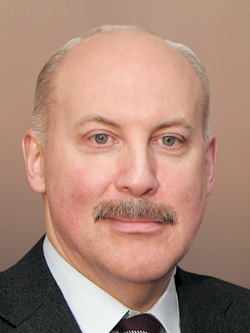
Party affiliation: Nominated by the East-Siberian Railway's labor union, which is part of Putin's All-Russia People's Front.
Background/platform: Mezentsev has been the governor of Irkutsk since 2009, when he was appointed by President Dmitry Medvedev. Although not a United Russia member, Mezentsev's candidacy was promoted by a labor union affiliated with the state-run Russian Railways monopoly headed by Vladimir Yakunin, a powerful member of Putin's inner circle. Mezentsev indicated his loyalty to Putin by claiming that their competition will be "formal." He was denied registration after the Central Elections Commission declared invalid a large number of signatures he submitted for inclusion on the ballot.
Strengths and weaknesses: Mezentsev was widely seen as a "technical candidate" to give a level of legitimacy if opposition candidates had decided to boycott the election, since the law requires at least two candidates participate. No one really viewed his candidacy as true challenge to Putin.
"If Mezentsev won the election, the first thing he would do is appoint Putin prime minister and then step down himself in order for Putin to become acting president, in line with the Russian Constitution," said Alexei Makarkin, a political analyst with the Center for Political Technologies.
Business climate: Given that most expected that Mezentsev had no plans to stay in office, no major changes in the business climate were to be expected, Makarkin said.
Chances: Seeing as Mezentsev's popularity in the Irkutsk region is rather low, he had no real base of support. He also came under fire in June 2011 after ordering his aides to delay a regularly scheduled Aeroflot flight to Moscow for which he was running late. A few months later, Mezen-tsev was criticized by Medvedev for failing to douse forest fires around Bratsk, the region's second-largest city.
— Irina Filatova
Svetlana Peunova
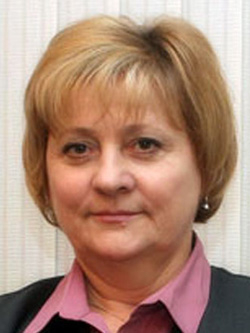
Party affiliation: Founder of The Will, an unregistered party based around a folk medicine center Peunova runs.
Background/platform: Peunova, 54, is the author of several books on popular psychology and spiritual wellness. She runs the Svetlana Peunova Academy of Development in Samara, which provides psychological services. She claims her party has 50,000 members in 43 regions. She campaigned on a nationalization platform and vowed to abolish the requirement of State Duma representation for parties to nominate a presidential candidate. She believed that members of all professions must be represented in legislative and executive bodies. She was barred from running after only collecting 243,000 signatures out of the required 2 million.
Strengths and weaknesses: Perhaps Peunova's biggest strength was the fact that she was little known to the electorate — what little that is known is bizarre to say the least. Peunova's organization has been viewed by some as a kind of cult. One of her group's beliefs is that a reptilian race is headed to earth on a comet to conquer and enslave its people. In 2008, police opened a criminal case against a director of her academy on charges of providing psychological services without a license, but the case was later dropped.
Business climate: If elected, Peunova said she planned to cancel Russia's entry into the World Trade Organization and oblige foreign investors to leave 30 percent to 50 percent of their profits in Russia.
Chances: None.
— Natalya Krainova
Grigory Yavlinsky
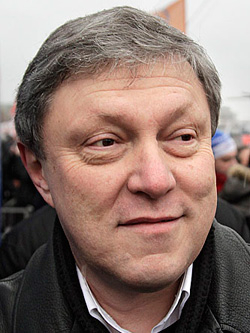
Party affiliation: Yabloko
Background/platform: An amateur boxer in his youth and head of the country's stalwart party of social-liberal positions, Yavlinsky is a true veteran of Russian politics. The 59-year-old first took part in presidential elections in 1996 when he secured 7.4 percent of the vote against Boris Yeltsin.
"Yavlinsky is the most popular candidate among people with independent views," said opposition political figure Vladimir Milov. The Central Elections Commission, however, did not allow Yavlinsky on the March ballot, claiming many of his signatures were forged. Yavlinsky said the decision was politically motivated. The Supreme Court dismissed Yavlinsky's appeal on Feb. 8.
Strengths and weaknesses: Yavlinsky is widely admired in intellectual circles and has not been tainted by corruption. He is known to stand by his principals and is well-regarded in the West. But he has generally kept a low profile in recent years and almost left the party to teach.
Business climate: Yavlinsky is an economist by training and authored the aborted 500 Days Program laying out a path from communism to a market economy. If he took office, Yavlinsky says he would revamp the Tax Code to force monopolies to pay taxes where they are registered and make individuals pay income tax where they live. He has also called for the abolishment of the military draft and for the publication of all spending by government officials.
Chances: Yavlinsky's presidential ratings were not high prior to his being blocked from the ballot and his support lies largely in Russia's major cities. In Moscow and St. Petersburg, Yavlinsky was polling at about 5 percent, but according to both state-owned VTsIOM and the independent Levada polling centers, he only had about 1 percent support among the total population.
— Alexander Bratersky
Mikhail Khodorkovsky
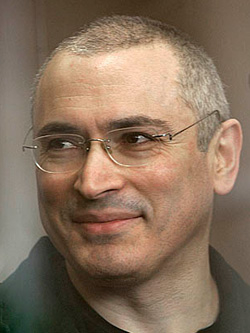
Who: Russia's most famous prisoner and once the country's richest man.
Background/platform: The former head of what was once Russia's biggest oil company, Yukos, Khodorkovsky has been jailed since 2003 on embezzlement and fraud charges that are widely viewed as politically motivated. A second trial and conviction in 2010 have further worried observers. Khodorkovsky has many supporters and human rights activists consider him a political prisoner, as his imprisonment has been seen as an act of revenge by Vladimir Putin for the ex-Yukos chief's political and business ambitions. In frequent articles written in jail, Khodorkovsky urges modernization of the judicial and prison system in Russia. Before going to jail, Khodorkovsky sponsored several educational programs and liberal opposition forces.
Strengths and weaknesses: Although he doesn't have a platform, observers say Khodorkovsky could one day emerge as the head of a growing opposition movement in Russia, at least "as a moral authority," as Yevgeny Gontmakher of the Institute for Modern Development put it. But as Khodorkovsky was once the wealthiest man in the country, he carries much of the same baggage as the rest of the oligarchs.
Business climate: Khodorkovsky's second verdict is often viewed as an example of what worries investors most — weak rule of law and a politically manipulated judiciary — which has resulted in a spoiling of the business climate. If he were released early, observers suspect that it would have a positive impact.
Chances: None. Khodorkovsky is unable to run until he is freed in 2016.
— Alexandra Odynova
Alexei Kudrin
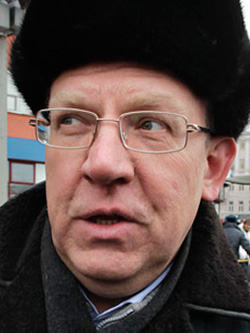
Who: Finance minister for 11 years.
Background/platform: Kudrin presided over a period of great economic growth and stabilization until his ouster as head of the Finance Ministry in September 2011 amid a public fight with President Dmitry Medvedev. Kudrin argues that Russia's model of capitalism has all the fundamental conditions for further development, but that development hinges on the spread of political freedom. One of the key milestones for the economy, which Kudrin shepherded through in 2006, was the abolition of restrictions on the movement of capital in and out of the country. Kudrin believes that this, coupled with a stable government, is the best stimulus for business. Investment is not growing fast enough, he believes, because of weak institutions and high inflation. Kudrin is in favor of capitalizing on the windfall from Russia's oil and gas revenues by rerouting most of it into a reserve fund. He argues that curtailing social spending by the government is a crucial step.
Strengths and weaknesses: Kudrin is seen as a smart professional, being awarded Best Finance Minister of 2010 by Euromoney magazine. But as a person with close ties to Vladimir Putin — who repeatedly called Kudrin a friend, even after he left the Cabinet — Kudrin is likely to avoid taking a confrontational stance and seek revolutionary change. Unlike many opposition leaders, Kudrin is not well-known as a person.
Business climate: Conditions for doing business would likely improve, with efforts to strengthen the rule of law and further tame inflation. Social spending under Kudrin would likely not grow and could even shrink, reducing the prospects of increasing the tax burden.
Chances: Routinely berated by the Communists throughout his career, Kudrin ranked third-least popular Cabinet minister in VTsIOM polls last year. In the most recent poll, held in September, 34 percent of respondents said they disapproved of him. In a poll by Levada Center in December, Kudrin shared eighth place with Mayor Sergei Sobyanin as the most trusted Russian political leader. He has made no move signaling an intention to run for president, but some suspect he may be tapped to be the next prime minister.
— Anatoly Medetsky
Eduard Limonov
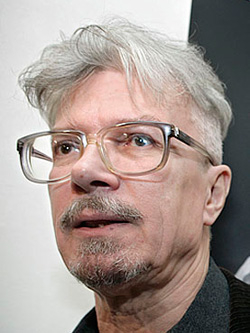
Party affiliation: The Other Russia
Background/platform: Nationalize! A celebrated fiction writer, Eduard Limonov, who will turn 69 on Feb. 22, has been a fixture of the radical left for almost 20 years, first as leader of the National Bolshevik Party — which was banned in 2007 — and currently as head of the unregistered The Other Russia party. Repeatedly arrested for staging small-scale protests, Limonov has struggled to expand his appeal beyond a small group of mostly young activists and has never held elected office. He was refused registration for the 2012 race because of problems with his application, the Central Elections Commission said. Limonov cites his time living in France, fighting in Yugoslavia and sitting in prison as experiences that have prepared him to serve as president.
Strengths and weaknesses: His main strength is his sheer tenacity and consistency, but he has never managed to gather widespread support.
Business climate: Limonov calls for the nationalization of oil, gas and minerals companies, arguing that the nation's natural wealth should belong to "the people." He also calls for the capital to be moved to southern Siberia, a project he says would employ millions, improve infrastructure and "stop China's expansion." Analysts say his policies would spell disaster for the economy.
"Nationalization is a very bad idea for the investment climate. It would also lead to increasing inefficiency because the state is a bad manager," said UralSib chief economist Alexei Devyatov.
Chances: A perennial outsider, Limonov will likely always remain outside the mainstream. An online poll on Gazeta.ru showed Limonov with just 1.4 percent of the vote as of Feb. 14.
— Jonathan Earle
Dmitry Medvedev
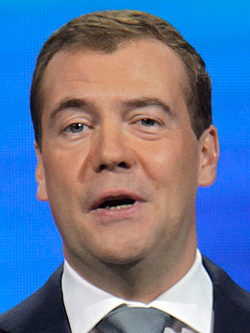
Who: Russia's soon-to-be ex-president and perhaps future prime minister.
Background/platform: Medvedev entered the Kremlin in 2008 and was widely viewed as Vladimir Putin's puppet at the time. As the end of his term draws near, that image has returned. However, during his four years in office, he did manage to convince some that he was the man who could finally transform Russia into a modern state with a diversified economy. Many of those people have now taken to the streets in protest against Putin's decision to return to the presidency. Medvedev's term was in many ways aspirational — like expensive perfume that gives you an air of luxury, he embodied the hope that Russia could finally overcome its entrenched deficiencies, but in the end it may have been just scent and no substance.
Strengths and weaknesses: Among his greatest assets is his enthusiasm for reform, which he spelled out in numerous speeches and policy initiatives that range from the police force to punishments for economic crimes. While his supporters argue that Medvedev needed more time to implement his ideas, critics say he lacked the power. He has long labored under the shadow of his mentor Vladimir Putin, with many believing that without Putin there is no Medvedev.
Business climate: Medvedev quickly developed a penchant for modernizing the economy and regularly called for reducing bureaucracy, fighting corruption and improving the business climate. His success was mixed though — last year Russia remained well below the top 100 in the World Bank's Business Climate Index (120) and Transparency International's Corruption Perceptions Index (143).
Chances: Since it was announced that Medvedev would not attempt to return for another term, his approval rating has plummeted to just 15 percent, far below Putin's 27 percent, according to the independent Levada Center.
— Nikolaus von Twickel
Alexei Navalny
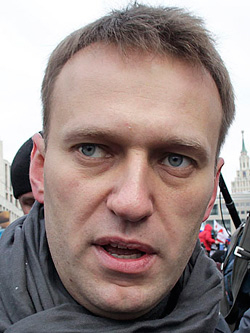
Who: A leading opposition figure who made his name operating an anti-corruption blog.
Background/platform: Navalny was a former member of the Yabloko party until his expulsion in 2007 for his nationalist beliefs. He is a member of the organizing committee for Moscow's recent street demonstrations and is very much focused on destroying the current regime. Still, Navalny has given few details on specific policies that he might implement if he ever came to power. In the run-up to December's Duma elections, he urged people to cast their vote for any party but United Russia — "the party of crooks and thieves" in Navalny-speak. A fervent critic of corruption, Navalny has also supported the right to bear arms and tighter controls on immigration. He has so far resisted calls to create a political party.
Strengths and weaknesses: A lawyer by trade, Navalny made his name waging a one-man war against corruption on his popular blog and through his RosPil site that tracks government tenders. Though Navalny's 15-day arrest after a Dec. 5 protest helped to transform him into more of an "offline leader," his support is overwhelmingly Internet-based. He has never held public office but describes himself as a "politician" and does not hide his political ambition. The League of Voters, an opposition group fighting electoral fraud, barred Navalny from joining because of his stated presidential hopes. Navalny is a staunch supporter of the annual nationalist Russian March and was its co-organizer in 2011, but his nationalist views have troubled many of his more liberal supporters.
Business climate: If Navalny's political position is somewhat unclear, his economic policies are even foggier. But he took a step recently to clear up some of the confusion with an appeal during a meeting with top bankers on Jan. 6. Ivan Tchakarov, an economist who attended the meeting, later wrote that Navalny had expressed support for many of the economic programs discussed — from proposals by Sberbank head German Gref to those of Prime Minister Vladimir Putin. He even said he generally approved of the article on economics written by Putin that was published last month. Given his outspoken position on corruption, businessmen should be confident that if president Navalny would do his utmost to stamp out what has been seen as the chief blight on Russia's investment climate.
Chances: There are no official statistics on Navalny's popularity, as his support base lies in the Internet sphere. Since his account was set up in 2006, the 2,566 posts on Navalny's blog have attracted 66,500 followers. He also has 193,670 people following him on Twitter. An online poll on Gazeta.ru had Navalny taking 10.5 percent of the vote as of Feb. 14.
— Howard Amos
A Message from The Moscow Times:
Dear readers,
We are facing unprecedented challenges. Russia's Prosecutor General's Office has designated The Moscow Times as an "undesirable" organization, criminalizing our work and putting our staff at risk of prosecution. This follows our earlier unjust labeling as a "foreign agent."
These actions are direct attempts to silence independent journalism in Russia. The authorities claim our work "discredits the decisions of the Russian leadership." We see things differently: we strive to provide accurate, unbiased reporting on Russia.
We, the journalists of The Moscow Times, refuse to be silenced. But to continue our work, we need your help.
Your support, no matter how small, makes a world of difference. If you can, please support us monthly starting from just $2. It's quick to set up, and every contribution makes a significant impact.
By supporting The Moscow Times, you're defending open, independent journalism in the face of repression. Thank you for standing with us.
Remind me later.


